If you’ve never heard the name Kristiene Clarke, film programmer/trans historian/actor Jaye Hudson (aka TGirlsonFilm) plans to change that. Since Jaye discovered Kris’ film Sex Change: Shock! Horror! Probe!, the two of them have been screening the film to contemporary crowds. Even in the present day, the objectivity of trans journalists and filmmakers is often questioned when covering trans subject. But back in the ’80s, Kris managed to make this film herself for Channel 4.
I went into our conversation eager to learn how we’ve regressed only to learn a much more interesting truth about the film’s production and Kris’ career. Beyond this trans documentary that features interviews with a wide range of everyday trans people and notable British trans figures, Kris has made about 70 other films.
Sex Change: Shock! Horror! Probe! is currently available to rent on Vimeo and Jaye is working to ensure the rest of Kris’ body of work is available soon too. I spoke with Kris and Jaye about Sex Change, the ways trans life has transformed since the ’80s, and how Tilda Swinton got involved in the film.
Drew: How did you get the job to make this film?
Kris: I’d just made two shorts for Channel 4 which used to be an independent channel set up with the precise aims of giving voice to underrepresented and diverse communities. One short was about child abuse which I did as an opera and one was about child abduction which I did as a musical. Throughout this various friends of mine were getting outed by the media. Like the model Tula, Caroline Cossey, who was originally going to be in Sex Change, she was outed and the headline was “James Bond’s Girl Was a Boy.” Then another friend of mine got outed and then another friend of mine got outed. I thought, well, eventually this can happen to anyone. So I wrote a proposal and pitched it to Channel 4.
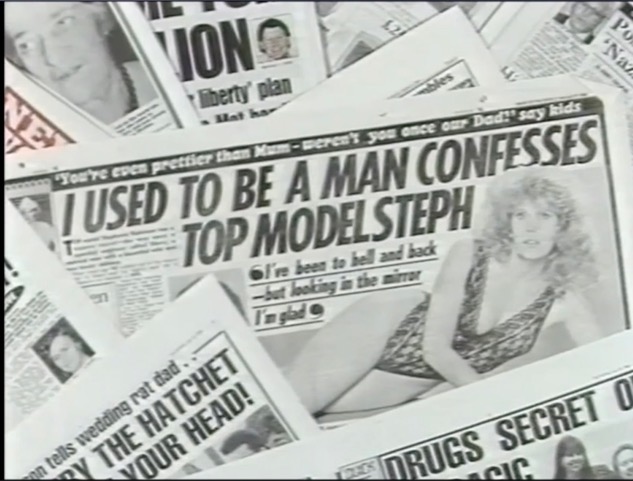
I wasn’t prepared for the backlash I got. This was in 1984. And basically I came up against the separatist feminist, biological determinist lobby, one of whom was a commissioning editor who had all kinds of objections. It took two or three years to get it made from that point onward, going through various appeal processes inside Channel 4.
Then they came up with the idea that they didn’t want me to direct it, but I could produce it. They wanted to give me a director who would give it some kind of objectivity — someone who was another separatist feminist, biological determinist. I wanted to get the film made so I agreed to it. But my first act as producer was to say to the director: Stay at home, I’ll give you the money, but you’re not directing this film. I’ll give you the credit and pay you your full salary, but you don’t come on set. That was it.
Drew: Wow that’s so interesting. My next question was going to be whether you thought a trans person in the present day would ever be allowed to make something like this. But you weren’t technically allowed with this film either and you just managed to do it anyway.
Did that also play into titling? The title of the film and the film itself feel quite different tonally.
Kris: No, I came up with the title. Every week there was one of these sex change headlines, so I thought, well, the way to get the biggest audience is to give it a sensationalist title, but then deliver a non-sensationalist film. A film that was authentic while also entertaining. I didn’t want a dour, “poor me” story. Most of the documentaries up to that time were “poor me” stories or a medical story concentrating on the transition. I wanted to kind of parody some of those elements within the film.
Drew: Did you stay in touch with the participants you spoke with? Are any of them still around?
Kris: There’s only one around now. Jaye can tell you more about what happened to the others. She does a beautiful epilogue to the film that explains what everybody went on to do. The one person remaining is named Adèle Andersen, she’s the singer in the film. Adèle was one of my main reasons for doing the film, because she was outed as well. She joined an all-female group and then a tabloid newspaper called News of the World revealed that she was “born a boy.” Adèle was my motivation and we’ve remained friends ever since. The others I kept in contact with to a certain extent but as my career took off and I was jetting around the world, you lose those kind of close contacts.
Drew: Jaye, can you share more about the others?
Jaye: Mark Rees went on to become the Liberal Democrat counselor for Tunbridge Wells in 1994. He was also part of Press for Change which was a lobbying group in the 90s along with Steven Whittle and Christine Burns. He eventually got his gender recognition with The Gender Recognition Act, but there’s a funny quote where he says, “It was a little anti-climactic.” When I showed the film for the first time a couple of years ago, Mark was still with us, but we found out after the screening that he passed away that week or that night.
Kris: That night.
Jaye: It was quite moving and weird.
Then Stephanie Anne Lloyd led a very exciting life. She had three Transformation shops, one in Euston Road in London which was there until 2008, and actually there were a couple of trans women who have come to the screenings and said they’d been to that shop, and there’s still one in Manchester. These crossdressing shops were places of capital but also community.
There was an incident where the police raided her home for circulating pornography, because her trans videos didn’t have certificates from the British Board of Film Classification. She ended up in a women’s prisons for about three months. She then had a chain of luxury transvestite hotels in the 2000s and had her own reality TV show with BBC Wales called Hotel Stephanie which is quite fab. She also tried to take over the football club Wrexum AFC.
Kris: Which is now run by Ryan Reynolds!
Jaye: I’d rather Stephanie have run it.
Drew: (laughs)
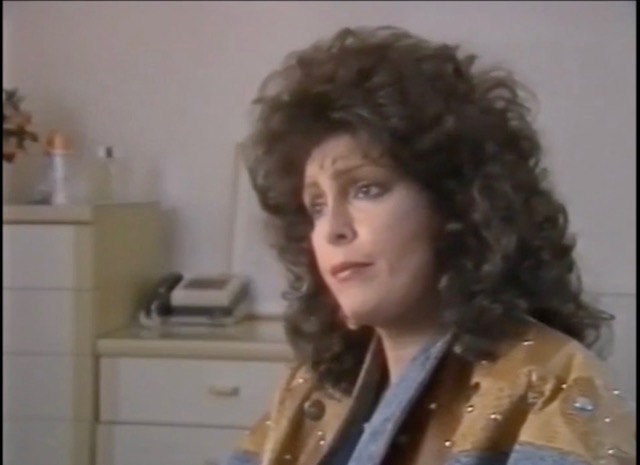
Jaye: Rachael Webb, the politician, got back on the road and started being a truckdriver again which I was pleased about. Seems like she was happier with that. She was a big trade unionist, and there was a lot of solidarity between the cis truckers and this trans lady trucker. She passed away in 2009. I don’t usually say this at the screenings, because it’s not the tone, but she took her own life.
And then there’s Christine Goodwin, who was the bus driver. She’s someone who is so indicative of the way as a trans person you end up doing something remarkable just by trying to carve out and live your life. In the film, she’s just this amazing portrayal of working class trans life, but then in the late 90s/early 2000s she wasn’t allowed to get her pension because she wasn’t seen as legally a woman. It became a similar fight to what Mark was embarking upon in the European Supreme Court. She took it to the European Supreme Court which has been the case on everyone’s lips: Goodwin vs. The United Kingdom. She was the lead person to get the Gender Recognition Act to come through, and now the Good Law Project are taking Goodwin and the Equality Act from 2010 back to the European Court after what happened with the Supreme Court a few weeks ago. So what she did was actually really monumental because we got that big piece of legislaton. That’s what she went on to do and then she passed away in 2014. The other thing that’s significant is she was one of the few trans people to use her name in her application to court, because she “had nothing to be ashamed of.”
So yeah they all went on to do significant and moving things just by living life as trans people.
Drew: Jaye, when did you first see the film?
Jaye: I was doing a series at the Prince Charles Cinema on trans exploitation cinema. We went from Glen or Glenda to She-Man to Let Me Die a Woman! and I must’ve just been going through archives and Letterboxd lists and I fell upon Sex Change: Shock! Horror! Probe! It was English, and alongside being a film programmer, I have a deep interest in trans history, specifically British trans history because it’s where I’m from. I found and watched the film and it was so remarkable that it got made, that it got made by a trans woman, and that it broke through class barriers. It didn’t just have a Tula or an April Ashley — it had a bus driver, a politician, a conservative capitalist.
Kris: (laughs)
Drew: (laughs)
Jaye: Kris always says that Stephanie saw trans as a capitalist enterprise with creams that magically make you grow tits. (laughs) But yeah I just thought it was a beautiful exploration of different classes of trans people. And in that amazing Channel 4 way, it had moments of real artistry with the repeated motif of the closing doors. You don’t see that in documentary much anymore.
When I watched the film I happened to live two roads down from Kris. I spoke to a local trans filmmaker who I know and he said he’d heard a lot about Kris from Campbell X who is another trans filmmaker who made Stud Life. Then I think it was through Campbell I got her number and then we had a coffee and have been showing the film ever since.
Drew: Can you talk about some of the exploitation films you were watching and how this film is different?
Jaye: The immediate thing that comes to mind is how the film is quite playful with previous cis images of transness. So, for example, you often have the repeated motif of the trans woman shopping, but in Kris’ film you have the trans man going around looking for a suit and tie and it’s made much more ordinary and mundane. It’s just buying clothes rather than a sad trans woman mournfully staring at a sparkly bra.
Drew: (laughs)
Jaye: There’s also not a sudden jump scare to a big surgery scene. There’s not an empahsis on surgery details. No cis person is platformed. Trans people are allowed to have diverse opinions vs. something like Let Me Die a Woman! There’s a reality to it and people are allowed a sense of humor that aren’t allowed in some of the others.
All this to say, part of the project with the trans exploitation films was also to not just discard the work as cis gaze. Because I mean Ed Wood was clearly kind of trans.
Drew: Oh yeah.
Jaye: And She-Man has trans people in the background. It might not be very trans, but it is ripped from the pages of Female Mimics-style magazine. Then Let Me Die a Woman! had a trans cinematographer. So there are moments in those films of the truth breaking through but I think they’re quite a bumpy ride and it’s smooth sailing with Kris.
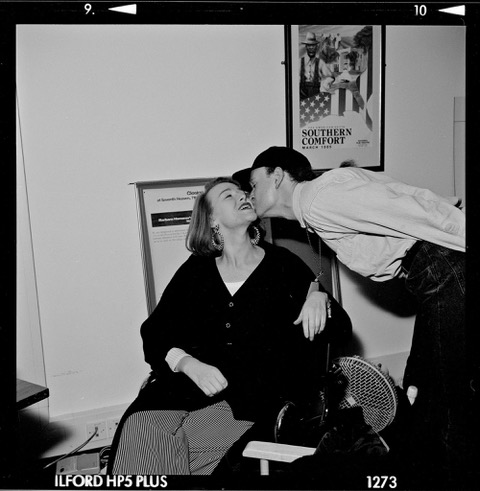
Drew: Kris, I feel like people are talking about this current moment as if we’re moving backwards. And I’m always interested in the ways in which we are, in fact, moving forwards even if that forwards doesn’t look how we dreamed and hoped. So in this moment that’s become more regressive, where there’s new legislation in the UK and the US and beyond, what do you see as the differences betweent the challenges in this moment vs. the challenges in the ’80s?
Kris: Well, the good thing about this moment is social media. It’s easier to form alliances and get to know other people in other parts of the world. We can form a cohort. Obviously back in the ’80s, we didn’t have that. We had phones and we had walking to see somebody. I would’ve loved to have the digital world back in the ’80s. I wish I’d thought of it!
I think the challenges are still the same. It’s the legislation. Trans people are moving forward because we have these shared experiences, but we’re all demonized by the media, regressive politicians, outdated laws, and this new lobby that’s sprung up that’s actually very small but has a very loud voice and a lot of money backed by J.K. Rowling.
When you look at what’s happening in Gaza, when you look at the war in Ukraine, when you look at the civil war in Sudan, to believe that trans people are the biggest threat to the world is just bonkers. I can understand a bit more the focus on trans people in the ’80s, because we were seen as infiltrating the women’s movement. There was a woman named Janice G. Raymond who was an American academic and she wrote The Transsexual Empire. The basis of it was that trans women were infiltrating the women’s movement to make it gay male. Again, it’s just bonkers. I don’t know where people come up with these ideas. But that sort of galvanized the separatist feminist movement in the ’80s. And I think what galvanized the separatist feminist, biological determinist movement now was J.K. Rowling speaking out and then people just jumped on the bandwagon.
Jaye: Also from an American perspective, I wouldn’t underestimate the TERF politics in Britain that started quiet and has gotten signifcantly louder as the years went on. I did a zine project called Tranny Central with Roz Kaveney who is a trans woman who was a part of the gay liberation front. She started her own kind of STAR called Tranny Central in Notting Hill with Rachel Pollack. The reason Rachel had to eventually leave that movement and those circles was because TERF politics had gotten into the women’s liberation front and gay liberation front. You can chart this split of the gay liberation and women’s movement from Janice Raymond to Kris making her film to something like the For Women Scotland Movement. And obviously in the past 10-15 years it’s gotten more complicated, because they seem to have gotten so annoyed about gay marriage.
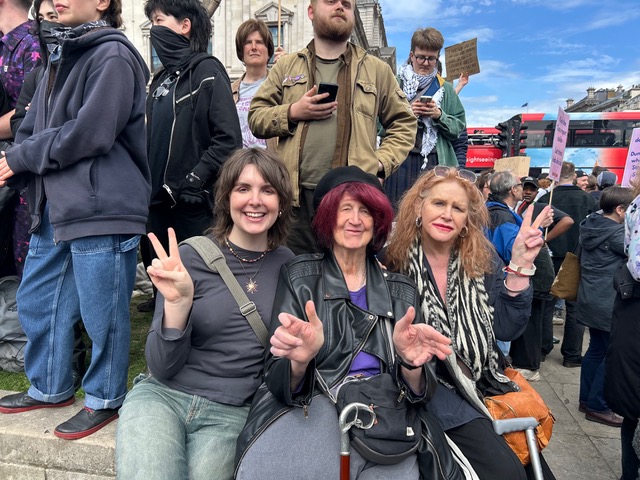
In the States, it’s the evangelicals, whereas in the UK it’s actually TERF politics that have had quite a potted, scary history. And it’s bizarre to see it get all the way to somewhere like Downing Street.
Wasn’t Sex Change originally supposed to be three parts?
Kris: Oh yeah. Originally it was going to be a three-part series looking at gender and sex, looking at the court case with April Ashley, and then it was going to go through the different politics of the early ’80s. It would have ended with this case is being taken to the European Court and we’re getting on with living our lives the best we can under a repressive and regressive legal system.
But that was part of the negotiations. Eventually they just gave me one hour. And with the provisos of the director I mentioned earlier.
For me, it seemed to have gotten better through the 90s. The law didn’t come into it as much. And then come the 2000s we got the Gender Recognition Act, but people were still being outed. It still seemed to be a societal taboo if you changed gender. And it became thought of as more deceitful. Those people are deceiving you if you get into a relationship with one of them. Make sure you know who you’re getting into a relationship with. It became a little more…
Jaye: A little more tabloid in the 2000s.
Kris: A little more tabloid in the 2000s leading up to where we are now. For me, the sadness is not just the lesbian separatist movement but the LGB Alliance that are backing all of this. Having been on marches against Section 28, AIDS marches with ACT UP, it saddens me that one oppressed group is hierarching themselves above another oppressed group. There’s no solidarity. But that’s not all gay people obviously. There are gay people who are on our side. The sadness is there’s a very vocal minority who have captured the media. Even the most liberal of newspapers in this country, like The Guardian, are still slightly rightwing. You still get them writing anti-trans articles as editorials.
Jaye: In terms of something positive…
Kris: (laughs)
Jaye: (laughs) I’m still able to have my trans cultural job which I don’t think many people in the 70s or ’80s would’ve been able to upkeep. Being a part of institutions like the BFI, Film London or Museum of the Home. The community has gotten bigger and it’s got more of a foothold in culture and my status as a trans woman film programmer is very small proof of the changes.
Kris: I agree. But I did go on to have a really good career. I made 70 films about being gay, being trans, being lesbian, HIV—
Jaye: Pigs.
Kris: Pigs! Another misrepresented group. I went on to have a really good career. But I think it’s all about aesthetics. I have friends who don’t pass that well who had a much worse time than I have. Aesthetics give you a certain entree into certain groups. So my life compared to some was fortunate, while still not easy. And I don’t think that’s changed. Hence the bathroom rule. If you can pass, you can get into a bathroom and nobody is going to ask you for your birth certificate because nobody carries their birth certificate. But if you don’t pass — even straight women who don’t pass are being asked! — then it’s a problem. This new law set by the Supreme Court has forefronted what people can do. It says it’s okay to challenge someone. But it’s not. There’s no humanity in that. It’s gone from the media outing to now empowering individuals to say to somebody, “Are you trans?” That’s shocking to me. And obviously we’re fighting back against it, including taking it to court, but it’s already there now. It’s been implanted in people’s heads. That’s the sadness for me.
Drew: Yeah, I think about the history of cis gay people and how in the early 20th century there was so much blatant gay behavior that could happen, because it wasn’t being looked for or talked about as much. You could get away with people thinking you were just pals. But then as visibility increased in these ways that were positive, it then became more of a focus and more fraught. It feels like that’s happening for us now.
Kris: It saddens me that your generation is having to go through this, because I thought all the battles had been won. I thought we fought those battles and with the Gender Recognition Act all the battles were done. That’s what saddens me that it has to be re-fought again. And it’s going to impact your age group. The bonkersness that the first executive order that Trump signed was about biological determinism. It’s nuts.
Drew: The last thing I wanted to ask about was Tilda Swinton reading the Sylvia Plath poem in the film. How did she get involved?
Kris: I wanted to give some kind of relief to the visual imagery and the stories that were being told and I was reading some Sylvia Plath poems one day and I thought “The Applicant” was perfect, because we were basically applying to be members of society.
Tilda wasn’t the first choice. The first choice was Vanessa Redgrave and that came about because Caroline Cossey was friends with Vanessa and suggested her. I met with Vanessa and we agreed to everything. She’d also been in a film called Second Serve about Renée Richards, the transgender tennis player, and she’d played Renée. We got talking about titles and I asked who came up with the title and she said that was the director’s call and she preferred In the Canteen. I said, what was that? And she said, “The ball is in the other court.” (laughs) It’s not very politically correct, but I thought it was really funny.
But then Vanessa had a scheduling conflict, because she was a big A-list actor at the time, so she sadly pulled out. I knew the queer filmmaker Derek Jarman and I was on set one day for a Pet Shop Boys video and a friend of mine was friends with Tilda. We just got talking and I said to Tilda, why don’t you come and do it? And she agreed. So basically, I discovered Tilda Swinton. (laughs)
She turned up and read it beautifully. I think we did four or five takes of it at different speeds, different tones, different emphasis. And she didn’t charge any money. She was happy to do it for the cause.
Jaye: One of our best transgender cisgender celebrities.
Drew: (laughs)
Jaye: I’d like to add, because Kris is far too humble, when I discovered the film what was so shocking was that it was made by a trans woman who was a contemporary of people like Derek Jarman and Isaac Julien and that whole movement of diverse leftist queer filmmakers from that era. I think Kris should be spoken of in that same breath.
Drew: Kris, how many of your other films are available online?
Kris: I’ve never put anything online, but some have turned up online. Jaye is going to digitize all my films for me though.
Drew: Oh amazing!
Kris: The ones that are most significant have made their way online. It’s hard for me to know, because they’re all my babies so I love all of them. I’d change all of them in some way but I love all of them. We’re going to start cataloguing them and putting them online.
I made a film about Sandra Bernhard called Confessions of a Pretty Lady which I believe is online. I made a film about Armistead Maupin that’s online. I made a film about the birth of the naughty nudes in 60s about the porn movement and I believe that’s online as well. But I didn’t put them online so the quality…
Jaye: YouTube rips.
Kris: That’s one of the tasks for this year though. Because I have them all on Umatic tapes or film or VHS. They’re all in my hallway here. But no one has those machines except historians.
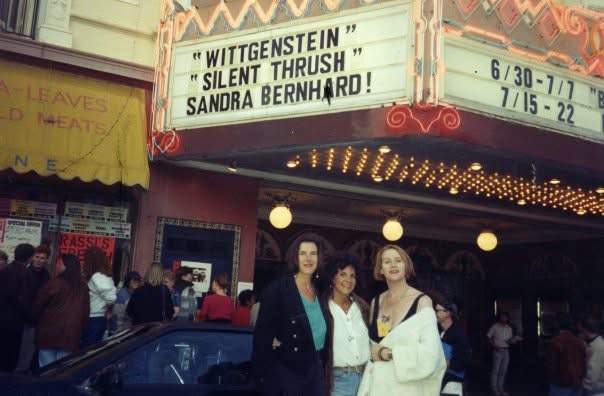
Jaye: And there may be one more to come.
Kris: We may be doing Sex Change 2! Take it from the film up to where we are now. Sadly, only Adèle is left to bridge that gap from my generation but there are lots of new voices.
Jaye: And, again, Christine Goodwin is the name on everyone’s lips at the moment.
Kris: And I think my film is the only one that features her.
Jaye: Yeah, she lived quite a private life, and even when she took her case to court, I don’t think she was particularly front-facing with it. That’s another thing that’s significant about Sex Change. It has an interview with the woman who introduced the Gender Recognition Act, driving a bus that I’ve taken loads.
That was actually my very first thought when I watched it.
Drew: You were like, that’s my bus!
Kris: The 73 bus goes to where I live. That’s probably why we had it. (laughs)








Comments
This is an amazing interview. <3 <3
Thank you so much, what a treasure trove of an interview!!